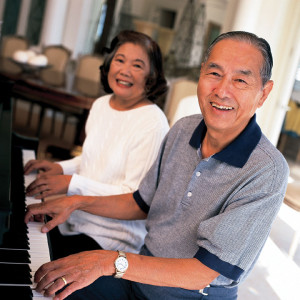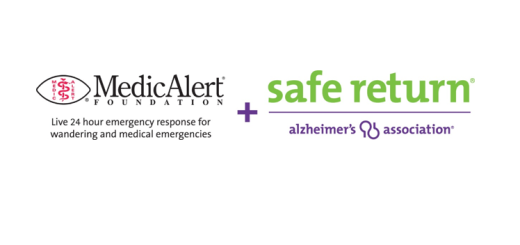Complementary Therapies That May Help
 There is no cure for Alzheimer’s disease, but symptoms may be reduced and quality of life may be improved – for a time – through any number of “complementary” therapies that are available. It is worth noting that most of these therapies can also help the caregiver to relax and gain some much needed respite. Consult your loved one’s occupational therapist or doctor about what therapies might best complement their existing medical treatment plan.
There is no cure for Alzheimer’s disease, but symptoms may be reduced and quality of life may be improved – for a time – through any number of “complementary” therapies that are available. It is worth noting that most of these therapies can also help the caregiver to relax and gain some much needed respite. Consult your loved one’s occupational therapist or doctor about what therapies might best complement their existing medical treatment plan.
Pet Therapy
Animal-Assisted Therapy (AAT) has been proven to help patients deal with challenging health problems as well as assist in recovery from health issues such as cancer treatment and heart disease. The therapy has also shown positive results for people suffering from mental and cognitive disorders such as post-traumatic-stress-disorder, autism and Alzheimer’s. Credentialed therapy animals (typically dogs) are routinely used in long-term care facilities, nursing homes and hospitals. They are also often brought in for general “visits” in nursing homes and adult day health programs, simply for the purpose of providing enjoyment and comfort to those who may otherwise be isolated or lonely. Therapy Dogs International is just one organization that provides this heartwarming service.
Studies have shown increased oxytocin levels (a hormone in the body that makes one feel happy and trusting), reduced blood pressure, reduced agitation levels, and improvements in health – all tied to interactions with a friendly, calming pet; whether it is an actual therapy animal or just a family pet.
Potential benefits include:
- Connectedness (touching/cuddling versus feeling disconnected)
- Quality of life improvements (distraction from pain; reduced depression, boredom and anxiety)
- Increased physical activity (walking, playing with or grooming the dog)
- Socialization opportunity (Non-threatening, non-verbal relationship building)
- Shareable moment with family children
For the caregiver, having a pet in the home can provide unconditional love, provide a feeling of happiness, and improve stress levels.
Music Therapy
Music can engage the mind, evoke memories from one’s youth, soothe agitation and stimulate activity. There are professional music therapists (American Music Therapy Association), or try exploring some music yourself at home, perhaps using an iPod or mp3 player (watch this lovely video showing how an organization called Music and Memory helps identify music that patients can connect with from their earlier lives). During the day, find some up-tempo music to stimulate activity, do some dancing or at least some toe-tapping! Towards dusk, when sundowning or the day’s exhaustion is catching up to everyone, try some more soothing music. Avoid music on the radio that has distracting commercials. Watch for non-verbal cues from your loved one. Are they moving to the beat? Do they look happy or engaged? Music can be a great way for you and your loved one to re-connect and share some joy.
Art Therapy
The Alzheimer’s Association has a wonderful art therapy program called, “Memories in the Making“. The program focuses on the use of art as the means to tap into memories and express emotions that might otherwise remain trapped inside. The therapy is typically held in small classes, with a leader trained in art therapy. For people in early stages of the disease, art therapy can also build self-esteem and provide a socialization outlet. You can also do art therapy yourself at home. Use safe materials, and try and keep the art simple (vibrant water-colors, clay). You may find that art is a way for your loved one to share a piece of themselves that you had previously thought was lost.
Aroma Therapy
Aroma therapy can have a calming effect in the early and middle stages of the disease for some people; however, the sense of smell can get impaired later on. Lavender oil, chamomile and lemongrass have been shown to relax. Most studies have been done with essential oils massaged into the skin; but you can experiment using safe, everyday scents that may trigger memories, such as pine needles, chocolate, cinnamon and fresh-baked cookies! Burning candles are available on the market, as are a variety of scented shoulder and neck pads, some microwavable, that use heat to release the herbal aromas.
Massage
Massage has been shown to relax the body and trigger a state of well-being, but it is important to ensure that your loved one enjoys it. Ask if they want to try it and be aware of new sensitivities they may have to being touched. Weighted blankets, which have weighted pellets sewn into them, can also provide a deep touch stimulation response similar to having a massage.
All of these therapies can be easily explored and some of them may help, if only for the moment. Remember to discuss with care-providers (doctors, occupational therapists) as they are not a substitute for conventional medical treatment, but meant to be complementary therapies.
Blog written by Alzheimer’s Association Volunteer Diane Blum
Click here for more caregiver tips and expert advice from Family Care Specialist Stephanie


















As a long-time volunteer in the Memories in the Making art program, I have seen the difference an hour of painting can make for the participant. Agitation or reluctance often gives way to peaceful contentedness. Each artist approaches the materials in a personal way. Prior artistic experience is unnecessary. With acceptance and minimal guidance, the painting that emerges is the work of that individual. Even in later stages of the disease, many are still able to find pleasure in their own creative marks.
Thank you for publishing this important article. Gentle yoga may also be helpful, both physically and mentally. For anyone in the San Francisco area, I recommend checking out UCSF Osher Center for Integrative Medicine. In addition to their Gentle Yoga classes, they have a great class for caregivers, called Mindfulness-Based Dementia Care.
These therapies can really have far reaching implications for fighting Alzheimer. Thanks for sharing. There is a new study conducted recently which claims that being bilingual can reduce the risk or severity of the disease.
I have just started to take care of a lady,with Alzheimer’s and her husband just passed reall need help or would like to Learn more on how to help her cope is there a website where I can talk to other caregivers? sherobe@live is my e- mail address. Any help would be appreciated!